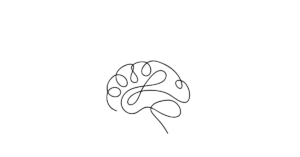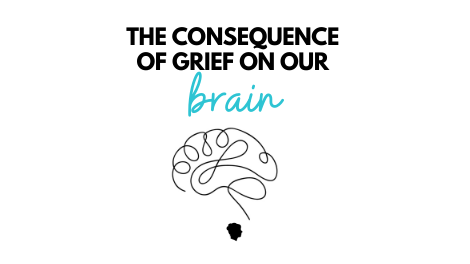You’ve probably heard the term ‘baby brain’ to describe the mind numbing fog that sets in when parents bring home a new baby and they are sleep deprived and overwhelmed.
You may have also heard the term, ‘chemo brain’ where people who are undergoing cancer treatment have trouble concentrating as a reaction to the medications being put into their body.
The concept of ‘grief brain’ is less discussed but is equally real.


Understanding How Grief Affects Our Brain Is a Game Changer
When you grieve, you experience physical, psychological, and emotional responses to the loss and it all starts in the brain.
When you experience a biological response to a loss in the brain, it means that the brain is trying to recover. Using functional MRI’s and CAT scans, researchers can see first hand how grief affects your neurology.
Neuroscience has shown us that underneath the emotional experience of grief are neurological changes that take place in the brain.
Four Types of Symptoms That Indicate Grief Brain
- Memory and recall are less sharp
- Concentration is compromised
- Emotional concerns like irritability, anger, sadness, numbness and anxiety
- Inability to make decisions
Studies utilizing FMRI’s on grieving people show us that specific parts of the brain are affected during grief. These parts include the limbic system and the prefrontal cortex
The limbic system is responsible for emotions, survival, instinct, and memory.
The amygdala, which is a part of the limbic system, helps to store memories and governs the perception of emotions like fear, anger, sadness, and aggression. Because the amygdala is also in charge of your survival, it’s the area of our brain that resists grief because it perceives grief as a threat. The amygdala houses all the emotional tools that you need to survive.
The prefrontal cortex is the part of the brain that is responsible for our ability to create meaning, planning, self control, and self expression.
Brain scans reveal that loss, grief and trauma can significantly negatively impact a person’s emotional articulation and expression. And that’s pretty messed up since it’s so important to be able to express these experiences to move through grief. and facilitate healing.
When you are grieving, a flood of neurochemicals and hormones stream around in your brain. Chemicals like dopamine and serotonin work in a fine balance to keep our mood stable.
During grief, these chemicals get thrown out of balance and disrupt your mood. This is why, if you are grieving, you experience such drastic mood swings and can cry at the drop of a hat!
Although your loss is deeply rooted in your heart and the love that you feel for your loved one, neuroscience has proven that the brain is also at play


Take These Steps To Start Healing Your Grief
After hearing about all of these biological factors that occur during grief, you might be thinking that you are powerless and just have to stand by and wait for the brain to get through the grief. Nope!
A lot of research over the last few years has been focused on neurogenesis which is the process in which new neurons are formed in the brain.
Neurogenesis in the limbic system improves memory, reduces stress hormones, and regulates mood. So you’ll want to engage in activities that promote neurogenesis when you are grieving.
According to studies, sustained physical exercise also promotes neurogenesis within the limbic system which in turn promotes regulation of emotions, memories linked to emotions, as well as the creation of new emotions.
Shared experiences, companionship and getting a good night sleep will also stimulate neurogenesis and reduce feelings of grief.
Research shows that making art also improves neurogenesis which is why making art in grief counseling can be another powerful way for you to cope with grief.
If you feel overwhelmed with grief and you would like to start the healing process, let’s connect. Contact me to schedule your complementary consultation to see if we would be a good fit.




